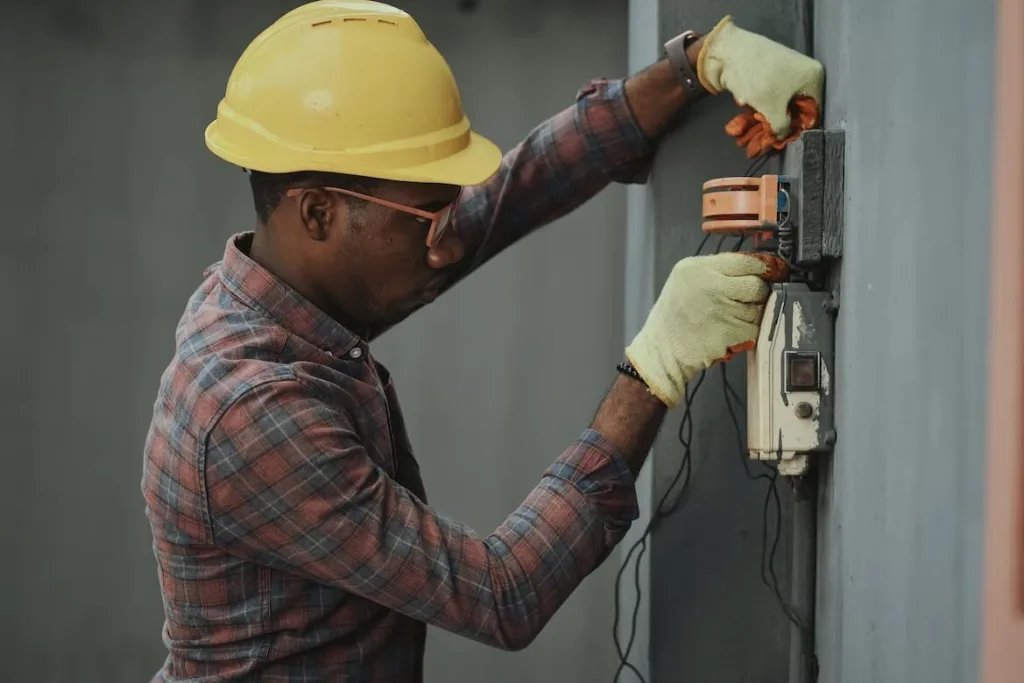Are you looking to have a commercial air conditioning system installed? If so, then there are some important things that you should know before taking the plunge.
Regular maintenance is key to getting maximum performance out of your air-conditioning system. This includes checking refrigerant levels regularly and replacing filters when needed. It’s also important to consider how many people occupy the area and the correct unit size for your specific space.
Regular maintenance is key to getting maximum performance out of your air-conditioning system. This includes checking refrigerant levels regularly and replacing filters when needed. It’s also important to consider how many people occupy the area and the correct unit size for your specific space.
Types Of Commercial AC Systems
No matter what type of system you choose, it’s important to work with experienced commercial AC installation professionals who understand how best to meet the specific requirements of your business environment. Commercial AC systems come in several varieties.
Split-system ACs are among the most common types of commercial AC units, and they involve an outdoor unit that houses a condenser coil and compressor, as well as one or more indoor air handlers for cooling/heating. Rooftop ACs are ideal for large buildings due to their size; they typically include an evaporator fan motor assembly and compressors mounted on the roof.
Ductless ACs don’t require ductwork but utilize individual wall units with small blower motors to evenly distribute cooled/heated air throughout a business space. Packaged ACs combine all major components into a single unit which can be placed indoors or outdoors depending on the needs of your building.
Chillers ACs are used mainly in larger commercial settings such as hospitals, universities, and office complexes; these systems contain multiple internal coils connected by refrigerant lines between each component.
All of these options provide efficient temperature control while helping to reduce energy costs over time.
Commercial AC Installation Requirements & Guidelines
For commercial AC installations, certain requirements and guidelines must be followed. It is important to understand these requirements to ensure a successful AC system installation. The most important requirement for any professional installation of an AC system is the layout and design of the entire system, including air handlers, ductwork, compressors, condensers, and thermostats.
Another important factor when considering commercial AC installation requirements is the space size or area where the unit will be installed. The size of this space determines what type and size of the equipment can be used within the building’s structure. In addition, all electrical and mechanical connections must be properly made before starting any commercial AC installation project.
Lastly, it is also important to ensure proper ventilation throughout the area so that your AC system runs efficiently without overloading other areas of your home or office. A qualified installer who understands these regulations can help ensure that your AC setup meets all necessary standards for optimal performance.
Benefits Of Professional Installation
A qualified technician will ensure your system is installed correctly and follows local building codes and regulations. With their experience and industry knowledge, they can help you maximize cost savings, energy efficiency, and system compatibility. Plus, if any problems arise during or after commercial AC installation, a professional will be able to troubleshoot quickly and identify the source of the issue.
A professionally-installed unit may also provide additional benefits, such as extended warranty coverage or better service agreements from certain manufacturers. In addition, working with an experienced installer means you won’t have to worry about incompatible parts or not meeting safety standards – they’ll ensure everything fits perfectly into place.
Commercial AC installation shouldn’t be taken lightly – only experts should handle these systems due to their complexity and potential risk factors. You can rest assured knowing your business is protected against common issues like poor airflow or erratic temperature control.
Potential Problems With DIY Installations
While DIY installation may seem cost-effective, it can often result in costly mistakes and inefficient cooling. However, with proper knowledge of air conditioning systems or the necessary tools to install them correctly, homeowners can avoid encountering serious hazards from improper commercial AC installations. From malfunctioning systems due to incorrect wiring to refrigerant leaks caused by faulty connections, DIY AC installations can cause more harm than good if not done properly.
Furthermore, many states have laws preventing homeowners from performing their commercial AC installation without being instructed by a professional HVAC contractor – further highlighting the need for caution during any DIY project involving an air conditioner system.
DIY commercial AC installations should only be attempted after thorough research has been conducted and all safety measures have been taken into account. Not only does this ensure that the job will be done right, but it also prevents any potential long-term damage from occurring.
Maintenance Tips For Optimal Performance
Regular maintenance is essential for optimal performance. In addition, proper air conditioner maintenance can save money in the long run because it helps prevent costly repairs and premature system replacement. To keep your commercial AC running properly and efficiently, here are some simple maintenance tips:
First, inspect your commercial AC unit regularly for any signs of wear or damage – leaking fluids, damaged wiring, etc. If anything looks off, contact a professional immediately to ensure the issue doesn’t worsen over time. Additionally, check the condenser coils monthly, as dirt buildup can reduce their efficiency; cleaning them with a garden hose should do the trick!
Lastly, don’t forget about changing out filters according to manufacturer guidelines – clean filters will help maintain good indoor air quality while improving energy efficiency. Remember that proper care of your system now can save you from headaches down the line – so take action today and reap the rewards of better performance tomorrow!

Frequently Asked Questions
What Type Of AC System Is Best For My Commercial Space?
One must consider all the elements when selecting and installing the most suitable system, from size, type, and energy efficiency to budget constraints. As a commercial AC installation expert, here are some key things you should know about choosing the right AC system type:
- Understand your needs – What is the size of your commercial space? How much cooling power do you need? Answering these questions will help narrow down your choice of systems.
- Research different types of systems – Many types of AC systems may suit your business’s requirements, such as split-system air conditioners, VRF (Variable Refrigerant Flow) systems, or chilled water systems. It’s important to research each one to determine its pros and cons to make an informed decision.
- Consider cost & energy efficiency – Cost is always a major factor when deciding on any purchase, but it’s especially true with AC systems due to their large price tag. Look for efficient models to help reduce operational costs over time while providing enough cooling power for your needs.
Are There Any Special Permits Or Licenses For Professional Installation?
Depending on where you live, local laws may require a permit and license to perform a commercial AC installation. Before beginning any project, you must check with your local authorities, as they can provide specific details regarding what type of commercial ac permits or licenses are needed for installation.
When seeking a commercial AC installation professional, ensure they have all the necessary documents, including permits and licenses from the proper authorities. These documents are necessary for the contractor to be legally allowed to complete the job. The installer should also know exactly how to properly install and configure your system according to code requirements so that it operates safely and efficiently.
How Much Does Professional Installation Cost?
When it comes to professional commercial AC installation, the cost can seem like a sky-high mountain. But don’t worry – understanding the cost of commercial AC installation can be challenging. With just a little research and knowledge, you’ll be able to get an accurate estimate for your project.
The first step is gathering information on commercial AC installation costs. This includes getting price estimates from local contractors or researching typical prices online. Comparing different prices will give you an idea of what’s reasonable and what isn’t when pricing for commercial AC installation services. You may also consider comparing pricing between different types of systems.
Are There Any Specific Safety Precautions To Take When Attempting A DIY Installation?
The last thing you want to do is cause damage or injury to yourself or your home. That’s why understanding the potential risks and taking necessary measures for safety should always be a top priority when installing an AC System.
There are several different considerations when discussing commercial AC installation safety. Here’s a quick look at some of the most important ones:
- Always make sure you have all the necessary tools, materials, and instructions before beginning the project.
- Only attempt to repair or modify something with professional help if you are completely confident in your ability to do so safely.
- Before making any changes, turn off the power supply to the unit to prevent electrical shocks or other hazards.
- Ensure adequate ventilation around the area where work will be done – this will help avoid hazardous fumes or gases from building up during the commercial AC installation process.
It pays dividends with reliable brands/companies whose reputation precedes them, ensuring maximum efficiency and performance from your newly installed air-con system!
How Often Should A Commercial AC System Be Serviced For Optimal Perfomance?
Knowing how often a commercial Ac system should be serviced can help ensure your business runs as efficiently and cost-effectively as possible.
Most commercial AC systems should receive full service at least once per year by an experienced technician. This checkup should include inspecting all parts of the unit, verifying refrigerant levels and pressures, cleaning air filters and coils, oiling moving parts if necessary, testing electrical components and connections for safety purposes, checking for water leaks from condensate lines, calibrating thermostats if needed, and more.
Having someone knowledgeable come out to inspect your system will give you peace of mind and help identify small problems before they turn into larger issues that could cause extensive repair costs down the line. Investing in regular maintenance now will pay off in long-term energy efficiency gains while keeping everyone safe and comfortable inside!
Conclusion
Regular servicing of your system is key in preventing damage caused by wear and tear over time. Think of this as giving your air conditioner a tune-up: just like a car needs its oil changed regularly, so does an AC unit require maintenance to stay healthy and efficient. Investing in professional servicing every 1-2 years will save you money in energy costs and give you peace of mind knowing that everything is running safely and effectively at all times.
At Tropic Air Conditioning service, our team has the experience and knowledge to ensure optimal performance from your commercial AC system. Check out the benefits of professional air conditioning installation in the next blog. Contact us today.




